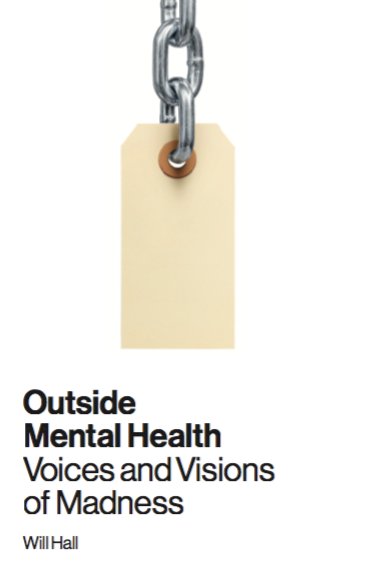Spiritual Emergence: David Lukoff
First Aired: 07-02-2008 -- 2 comments | Add comment

Clinical Psychologist David Lukoff talks about his madness experience and the spiritual transformation it triggered. David went on to become a leading figure in the field of Transpersonal Psychology and works to bring greater spiritual awareness into mainstream mental health practice.
http://www.spiritualcompetency.com
Podcast: Play in new window | Download (Duration: 49:48 — 45.6MB)
Subscribe: RSS



























 Creative Commons 2.5 copyright
Creative Commons 2.5 copyright
I was honored when Will asked me to add as a comment, some material from one of David’s classes that I recently guest taught at ITP.
I’ve know and learned from David for almost 25 years and know that what he has done world wide to advance the understanding of the spiritual dimensions of madness and to increase the humane response of professionals to consumers having psychotic/visionary experience is without equal.
He has boldly championed the consumer/survivor movement and in the mid 1980’s was the first professional I ever heard courageously reveal his own history of his own initiatory mystical/mad experience.
His brave leadership has emboldened many more of us to take that step.
He is a strong and beloved light.
Michael Cornwall, Ph.D.
Michael.cornwall(at)att(dot)net
Institute of Transpersonal Psychology –
class of David Lukoff, Ph.D.
April 26, 2010
Much Madness is divinest Sense–
To a discerning eye–
Much sense–the starkest Madness–
‘Tis the Majority
In this, as All, prevail–
Assent–and you are sane–
Demur–and you’re straightaway dangerous
and handled with a chain.
Emily Dickinson
Here are some thoughts that I wanted to share with you about how to best serve your clients who are experiencing a psychotic/visionary experience.
These suggestions are mainly gleaned from working daily as a primary therapist for 28 years with actively psychotic clients using a Jungian/Transpersonal approach.
During that time I worked for over 3 years at a 24/7, alternative, 20 bed, transpersonally oriented, acute care open door program where no medications or leather restraints were used or diagnoses given to consumers who were acutely psychotic.
I also helped develop a similar 5 bed program in Marin County, Passages In, that was short lived. I did several months of internship at St. George’s Homes in Berkeley where a similar Jungian/Transpersonal approach was used.
After that I worked for 25 years in public sector out patient clinics and on a mobile crisis team as well as in private practice. Even in those settings, most of the psychotic clients I served were not on medication.
I also am drawing on my doctoral research follow-up study done on the San Francisco based, medication free Diabasis House for clients in acute psychosis and my 25 year relationship with its founder, Jungian psychiatrist John Weir Perry.
But my early experience of serving from age 18 as a medic in the Army for six years and then as a State Hospital attendant with profoundly developmentally delayed men, and for 2 years as an orderly at a nursing home with brain damaged, demented and Alzheimer’s patients- also informs my advice on how to relate to people in pain and suffering.-
So, here are two basic principles for helping someone in a psychotic/transpersonal process which are distilled from my own experience and the study of successful Bay Area alternative programs.
1. Keep suspending your disbelief
Every time you tell yourself (believe that) the psychotic person you are being with has a tragic, lifelong, and threatening physical illness that has no inherent meaning or purpose – such as an injured brain, a genetically based diseased brain, an incurable thought disorder, or chemical imbalance – suspend your disbelief that another explanation may be possible.
Instead, hold the belief that they are going through a necessary, meaningful, developmental, initiatory, trans-formative, transpersonal/archetypal, symbolic and/or purposive natural process – one that is neither pathological nor indicative of a bio-medical brain disorder.
Hold the belief that, as Dr. Karl Menninger said, they might even come through the process “Weller than well!”
2. Be Receptive
Once you are able to stay open to the possibility that this person’s process is an important, potentially transformative natural life event, draw on all your skills of receptivity and empathy in order to be with them. Begin by simply listening and receiving the person with an open, compassionate heart.
As their process unfolds, gently invite and encourage the person to express both the emotional and symbolic content of their process. People in a psychotic process may need to use modalities such as drawing, painting, movement and evocative music to express themselves in addition to or instead of speech.
The common and overwhelming evidence from Diabasis, I-Ward, Soteria and every other alternative program from all over the world confirms the basic need for a person in such a psychotic/ transpersonal process to be believed in and received in this way.
Today I also wanted to share some observations I slowly learned for myself the past 30 years about how to more specifically make yourself available to the consumer in the room with you who is in a psychotic/transpersonal process.
To be most helpful try and feel like your inner subjective state is more emotional than mental.
Create a physical and emotional state of receptivity.
With your feet flat on the floor, hold the awareness that there is now a solid base and foundation beneath you.
Remember to keep your anal sphincter relaxed.
Keep a focus of energy in the hara chakra below your navel.
With your stomach muscles relaxed, feel yourself do deep and slow belly breathing.
Drop down your shoulders.
Let your face become calm and relaxed–not becoming pensive or quizzical.
Let your voice come up from your hara in lower octaves.
Let your kindly, gentle, even tender feelings of empathy and compassion arise in your heart chakra for a fellow human being in distress and suffering who is sharing the room with you.
Allow silences.
Don’t seek direct eye contact if it seems to make the person uncomfortable.
The person may be in a very heightened state of awareness and is processing minute inflections in your voice and body language.
Their ability to see into you may surprise you as uncanny and psychic.
In this state they may directly or symbolically tell you secret things about yourself that are disquieting.
If the person is hostile increase your vigilance on your own physical and emotional markers of receptivity.
Because you may find that you may involuntarily be holding your breath.
You may notice your throat becomes constricted and your voice goes up in octaves.
You may notice you are opening your eyes very widely and blinking a lot.
You may feel the need to fold your arms across your chest or cross your legs.
To the degree that you can be aware of these shifts in you prompted by anxiety, you can refrain from them as much as possible and remain in the open, receptive, emotional and physical posture with a potentially physically or verbally assaultive person in a psychotic process.
The more you stay grounded and centered the more they will calm down, will not sense a fight or flight visceral response to them building in you.
Being with agitated clients in a psychotic process is kind of like practicing an internal martial art at times – a form of Aikido.
To give yourself the best chance of staying open and receptive be realistic about real danger to yourself.
Have fellow staff keep an ear open and check at your door if you are meeting with a hostile consumer.
Position your chair by the door if with an agitated client to allow quick exit if you are attacked.
Give yourself the intentional permission that if necessary to survive a physical attack you will struggle to defend yourself in a way that would cause the least amount of injury to your self and to the client until help arrives to contain the situation.
Madness is an ancient form of uncivilized wildness.
If you are given the opportunity to serve those traversing it’s mysterious depths and heights count yourself lucky, especially if they are not emotionally anesthetized by medication.
The efficacy results from the Agnews Project, I-Ward, Diabasis, and Soteria House all clearly demonstrate that without medication, most acute psychotic/visionary crises will in fact be the occasion for a life changing spiritual transformation if a 24/7 alternative, non-medical model sanctuary is provided.
My experience and research into alternative approaches for serving those in a psychotic/visionary process has led me to believe that that at least 50% of the consumers who become trapped in the mental health system could have avoided that fate if acute care, 24/7 Bay Area sanctuaries like Diabasis House, Soteria and I-Ward (where I worked )were available at first contact with the system.
Jung said that: “Psychiatry has turned the Gods into diseases.”
Unfortunately Jung and most Jungians have turned the Gods(and Goddesses) into archetypes: named and minutely described denizens of the collective unconscious that we can have an ‘as if’ relationship with at weekend workshops and schoomze with once and a while in our dreams.
Please don’t make that mistake as you enter your own shamanic vocation.
Behind every image, thought and word, there is an emotion first. Behind every emotion there is a universal archetypal power and emotional energy that must come forth as imagery that expresses that deep emotion. Behind every archetype is a totally autonomous living force of deity that has no historical bounds, no time bound form.
These deities, that use our lives and bodies as their playgrounds and every second hold us in sway as they incarnate themselves in us, ever emerging anew, arise out of a greater mystery of silence.
Weep for the prophets and so-called psychotic visionaries who are robbed of their life giving gifts from the Gods by our culture of fear and human arrogance. And weep for us that we still treat them as lepers when they are, and always have been a divine source of the mana we need to survive on earth.
As a psychotic process begins, the psyche is faced with such overpowering unbridled emotion that the inner emotional charge grows to become profoundly existential in nature and magnitude. As the client faces the initiatory challenge of young adulthood in such an all pervasive liminal depth, the ego, the frail manager of consensual reality, simply is engulfed by the soul depth liminality of an emotional power that triggers all forms of desperate attempts to give some fragmented sense of meaning to the inner experience.
It is a visceral, first chakra existential experience that seizes the individual. It is the emotional response to being lost. It may be experienced mainly as one feeling exalted and indestructible at first or feeling totally doomed and bewildered.
The experience may also fluctuate between being plunged into the underworld and being drawn up into heavenly realms with amazing rapidity.
In any case, if not made numb by medication, the psyche creates a mythic story along predictable lines. The drama is played out on the stage of the central archetype, the Self, where every kind of polarity may be experienced: good/bad, dark/light, male/female, life/death, desolation/birth.
Psychosis is the ultimate identity crisis and potential shamanic initiation. Our feeble, arrogant egos usually assume we are master of knowing “Who am I?”
As the pre-psychotic/visionary ego floats in this ignorant vulnerability over an abyss of the unfathomable depth of the collective unconscious and spirit world of gods, demons and ghosts, the ego is always just a few nights without sleep away from psychosis, or a drop of LSD away from psychosis, or from a psychosis triggered by a kundalini eruption, or a loved ones sudden death.
The unprepared ego of an especially vulnerable young adult facing autonomous functioning separate from their family is at risk from drowning in the depth of the affect and images of the collective unconscious.
It is remarkable that the childhood tasks of such a vulnerable ego do not overwhelm it. However, in the late teens and young adulthood comes the awareness of mortality and the knowing that physical survival and social acceptance and success depend on functioning separately from parents.
The pre-psychotic ego is not prepared to traverse the hero’s journey and initiation across so much underlying liminality. The affect of existential terror soon triggers a visionary alternative restructuring of the ego through a radical immersion in a mythical inner struggle for adult independence that is carried out at the archetypal center of the Self.
As the great R.D. Laing said after witnessing and attending many on such a journey at the Kingsley Hall sanctuary he provided:
‘From the alienated starting point of our pseudo-sanity, everything is equivocal. Our sanity is not true ‘sanity.’ Their madness is not true ‘madness.’ The madness that we encounter in ‘patients’ is a gross travesty, a mockery, a grotesque caricature of what the natural healing of that estranged integration we call sanity might be. True sanity entails in one way or another the dissolution of the normal ego, that false self competently adjusted to our alienated social reality; the emergence of the ‘inner’ archetypal mediators of divine power, and through this death and rebirth, and the eventual re-establishment of a new kind of ego functioning, the ego now being the servant of the divine, no longer it’s betrayer.’
©Michael Cornwall, Ph.D. 2010